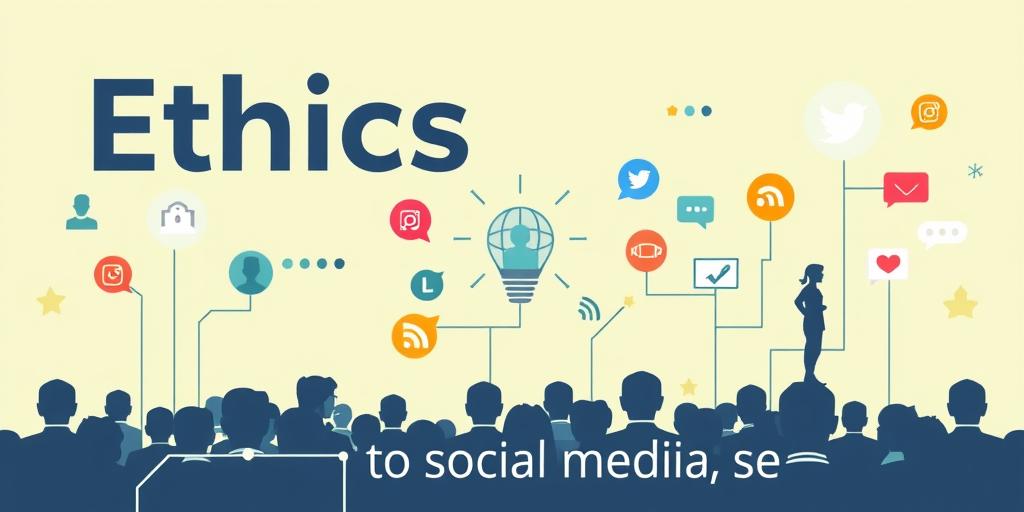Understanding the Ethics of Social Media Use
Social media has become an integral part of modern life, transforming how we communicate, share information, and conduct business. However, with its widespread adoption comes a complex web of ethical considerations. This post aims to explore the key ethical dimensions of social media use, providing a framework for navigating these challenges.
What are Ethics in Social Media?
Ethics, in the context of social media, refers to the moral principles and values that guide our behavior on these platforms. These principles encompass honesty, respect, privacy, and responsibility. Ethical social media use means making choices that consider the impact on ourselves and others.
Key Ethical Considerations
1. Privacy
One of the most pressing ethical concerns is privacy. Social media platforms collect vast amounts of user data, which can be used for various purposes, including targeted advertising and data analytics. Users should be aware of:
- Data Collection Practices: Understand what information is being collected and how it is used.
- Privacy Settings: Adjust privacy settings to control who can see your posts and information.
- Third-Party Apps: Be cautious when granting access to third-party apps, as they may collect additional data.
2. Honesty and Transparency
Integrity is crucial in social media interactions. This involves:
- Authenticity: Represent yourself honestly and avoid creating fake profiles or spreading misinformation.
- Disclosure: Clearly disclose sponsored content or affiliations to maintain transparency with your audience.
- Fact-Checking: Verify information before sharing it to prevent the spread of false news and rumors.
3. Respect and Civility
Social media should be a space for constructive dialogue. Ethical behavior includes:
- Avoiding Harassment: Refrain from engaging in cyberbullying, hate speech, or personal attacks.
- Respecting Opinions: Engage respectfully with differing opinions, even when you disagree.
- Promoting Inclusivity: Foster an inclusive environment that welcomes diverse perspectives.
4. Intellectual Property
Respecting intellectual property rights is essential:
- Copyright: Obtain permission before using copyrighted material, such as images, videos, and text.
- Attribution: Properly attribute content to its original source.
- Fair Use: Understand and adhere to fair use guidelines when using copyrighted material for educational or commentary purposes.
5. Responsibility
Users should take responsibility for their actions on social media:
- Consequences: Be aware that your online behavior can have real-world consequences, both for yourself and others.
- Accountability: Take responsibility for your posts and comments, and be willing to correct errors or apologize for mistakes.
- Digital Footprint: Understand that your online activity leaves a digital footprint that can be accessed and shared indefinitely.
Navigating Ethical Dilemmas
Ethical dilemmas can arise in various forms. Here are some tips for navigating these challenges:
- Pause and Reflect: Before posting or sharing, take a moment to consider the potential impact of your actions.
- Seek Advice: Consult with trusted friends, colleagues, or mentors when facing an ethical dilemma.
- Refer to Guidelines: Familiarize yourself with the ethical guidelines provided by social media platforms and professional organizations.
The Role of Social Media Platforms
Social media platforms also have a responsibility to promote ethical behavior:
- Content Moderation: Implement effective content moderation policies to address hate speech, harassment, and misinformation.
- Transparency: Be transparent about data collection practices and algorithms.
- User Education: Provide resources and tools to educate users about ethical social media use.
Conclusion
Understanding the ethics of social media use is crucial for creating a positive and responsible online environment. By adhering to principles of privacy, honesty, respect, intellectual property, and responsibility, we can harness the power of social media for good while mitigating its potential harms. As social media continues to evolve, ongoing dialogue and education are essential to navigate the ethical challenges it presents. By making conscious choices and promoting ethical behavior, we can contribute to a more trustworthy and inclusive digital world.









